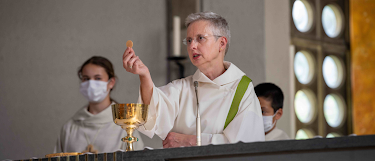Women, LGBTQ, divorcees: Swiss Catholics want reforms in the Church
Dare more synodality - and no discrimination against women, divorcees and queer people: This is the message the Swiss Church is sending to Rome.
Anyone expecting tough demands is likely to be disappointed when reading the Swiss final report. The tone is matter-of-fact, the wishes are well measured. This suits the Swiss tone, where people communicate less briskly than in the large canton of Germany.
Lay people may lead congregations, baptise children, marry couples
In the run-up to the conference, Felix Gmür, President of the Swiss Bishops' Conference, had already asked that the word "demands" be avoided - because Rome reacted allergically to it. No demands, but many wishes and suggestions are now being sent from the Rhine and Rhone to Rome.
Dorothee Becker leads a communion celebration in the Church of St. Francis, Riehen.
In some dioceses, Switzerland has been a global pioneer for decades - for example, when it comes to allowing lay people to lead parishes, baptise children and marry couples.
Progressive German-speaking Switzerland
Swiss Catholics would like to build on these experiences and move forward. The Swiss final report wants a synodal church that recognises "the royal, priestly and prophetic dignity and vocation" of the baptised. In other words, baptism is what counts. And: women, divorced and queer people should also be able to be ordained.
In French- and Italian-speaking Switzerland clericalism is even more widespread.
Switzerland consists of four parts with their own languages: German, French, Italian and Romansh. Each part of the country brings its own ecclesiastical colouring. While German-speaking Switzerland is considered relatively progressive, French-speaking Switzerland has a French influence and Ticino is Italian. Lay participation is less widespread here.
Criticism of clericalism
But that is to change. The Swiss final report emphasises two points. First, people should no longer be excluded - for example, women, divorcees and queer people.
On the other hand, the final report criticises the "clericalism that still exists in some places". Synodality can only succeed "if clericalism is overcome and an understanding of the priesthood increasingly develops as an element that promotes the life of a more synodically oriented church".
"We are ear" posters at Swiss railway stations
The final report is the result of months of work. As diverse as Switzerland is, the dioceses have shaped the synodal process in different ways. The Bishop of Basel, who is also President of the Swiss Bishops' Conference, set the bar high with a broad-based campaign.
"We are all ears" could be read on posters at Swiss railway stations. The photo montage showed Pope Francis and Basel Bishop Felix Gmür both grabbing their ears and struggling to listen.
77 percent think: The Church excludes women
The faithful were asked to get together in groups of five and answer 27 questions. The results of the three German-speaking dioceses were clear and unequivocal. 77 percent of the synodal groups in the diocese of Basel thought that the church excludes women. Queer people accounted for 64 per cent and divorced people 61 per cent.
The other dioceses chose their own paths and relied mainly on dialogue groups in the parishes. But here too, similar results emerged.
No synodal path in Switzerland
Representatives from the individual dioceses and the national churches discussed the results at the end of May at the Marian shrine in Einsiedeln. This has now resulted in the final report.
Group work at the national synodal assembly in Einsiedeln - here with Bishop Felix Gmür.
Switzerland is following with great interest how the Synodal Path is developing in Germany. The Swiss share many of the reform concerns of the Synodal Path. Many would have welcomed it if the Swiss bishops had also embarked on a similarly ambitious reform project.
Only a few took part in the synodal process
Part of the Swiss understatement is to make clear how little interest there was in the synodal process: participation in the synodal discussions was characterised by people "who are close to the church and, for example, involved in parishes", the final report notes. "The attitudes of the many church members who are distanced from the church were hardly recorded." Or in figures: less than one percent of all Catholics.
Bishop Felix Gmür and RKZ President Renata Asal-Steger accept requests for additions to the final report.
The Bishops' Conferences should forward their syntheses to Rome by the Assumption Day (15 August). Together with further submissions from all over the world, they will form the basis for the Synod of Bishops, which will take place in Rome in October 2023.
Then it will also become clear whether Bishop Felix Gmür's tactic is paying off: to forego demands - but in the end to have more wishes fulfilled.












.jpeg)

Comments